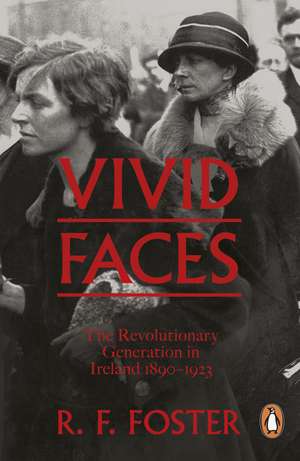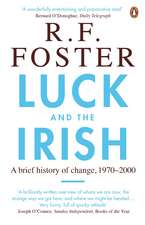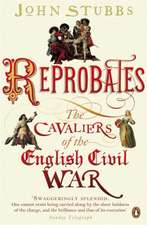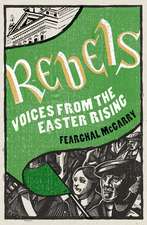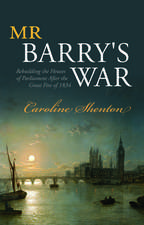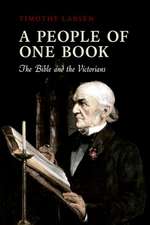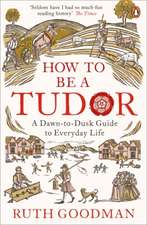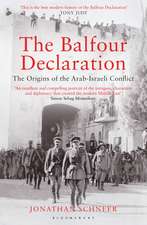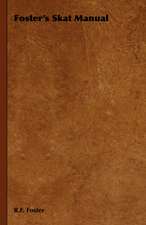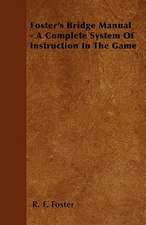Vivid Faces: The Revolutionary Generation in Ireland, 1890-1923
Autor Professor R F Fosteren Limba Engleză Paperback – 27 mai 2015
TIMES LITERARY SUPPLEMENTBOOKS OF THE YEAR andOBSERVERBOOKS OF THE YEAR 2014
WINNER OF THE AMERICAN HISTORICAL ASSOCIATION'S MORRIS D. FORKOSCH PRIZE 2016
'The most complete and plausible exploration of the roots of the 1916 Rebellion... essential reading' Colm Tóibín
Vivid Facessurveys the lives and beliefs of the people who made the Irish Revolution: linked together by youth, radicalism, subversive activities, enthusiasm and love. Determined to reconstruct the world and defining themselves against their parents, they were in several senses a revolutionary generation.
The Ireland that eventually emerged bore little relation to the brave new world they had conjured up in student societies, agit-prop theatre groups, vegetarian restaurants, feminist collectives, volunteer militias, Irish-language summer schools, and radical newspaper offices. Roy Foster's book investigates that world, and the extraordinary people who occupied it.
Looking back from old age, one of the most magnetic members of the revolutionary generation reflected that 'the phoenix of our youth has fluttered to earth a miserable old hen', but he also wondered 'how many people nowadays get so much fun as we did'. Working from a rich trawl of contemporary diaries, letters and reflections,Vivid Facesre-creates the argumentative, exciting, subversive and original lives of people who made a revolution, as well as the disillusionment in which it ended.
Preț: 83.51 lei
Nou
Puncte Express: 125
Preț estimativ în valută:
15.98€ • 16.62$ • 13.19£
15.98€ • 16.62$ • 13.19£
Carte disponibilă
Livrare economică 24 martie-07 aprilie
Livrare express 07-13 martie pentru 25.19 lei
Preluare comenzi: 021 569.72.76
Specificații
ISBN-13: 9780241954249
ISBN-10: 024195424X
Pagini: 496
Dimensiuni: 129 x 198 x 22 mm
Greutate: 0.37 kg
Editura: Penguin Books
Colecția Penguin
Locul publicării:London, United Kingdom
ISBN-10: 024195424X
Pagini: 496
Dimensiuni: 129 x 198 x 22 mm
Greutate: 0.37 kg
Editura: Penguin Books
Colecția Penguin
Locul publicării:London, United Kingdom
Notă biografică
R.
F.
Foster
is
Carroll
Professor
of
Irish
History
at
the
University
of
Oxford
and
a
Fellow
of
Hertford
College,
Oxford.
His
books
includeModern
Ireland,
1600-1972,Paddy
and
Mr
Punch,The
Irish
Story,W.
B.
Yeats(two
volumes)
andLuck
and
the
Irish.
Recenzii
Terrific.
.
.
It
is
a
measure
of
his
literary
skill,
as
well
as
his
expertise
as
a
historian,
that
he
is
able
to
counterpoint
so
many
life
stories
without
sinking
into
confusion
.
.
.
Foster's
prose
is
urbanely
precise
and
he
can
pin
down
character
as
memorably
as
Yeats
.
.
.
Foster
has
the
alertness
of
an
Edwardian
novelist
to
the
nuances
of
class
and
location
.
.
.
depicted
with
masterly
economy
in
all
its
brutality,
confusion
and
courage
.
.
.Patient,
analytical,
articulate,
this
is
a
book
that
counts
because
it
avoids
the
Irish
vice
of
replacing
history
with
commemoration
This book . . . reveals a rich and assorted cast of characters with a diversity of views and preoccupations - feminism, socialism, religious diversity, sexual liberalism, the works . . .The beauty ofVivid Facesis that it is squarely based on the testimonies of the characters themselves - letters, diaries, articles, books and later memories - and shows them as they were, not in the light of what they became, especially those revolutionaries sanctified in the selective historical memory of the Irish Republic. . . There are very funny accounts here of how summer schools in the Irish-speaking west of Ireland were an opportunity for unchaperoned young people enthusiastically to pair off . . .There can be few better accounts of [these] people . . . than this book.Foster writes with unconcealed delight about the foibles of these wonderful individuals as well as their achievements . . .There will be any number of accounts of the Easter Rising and its genesis in the run up to the centenary, but few will be as enjoyable as this
Foster has managed to producethe most complete and plausible exploration of the roots of the 1916 Rebellionand the power it subsequently exerted over the public imagination. As the centenary approaches, his book will beessential readingfor anyone who wishes to follow the argument about the Irish revolutionary generation
A significant accomplishment that makes a serious case for the concept of 'generations' in exploring the origins of the Rising . . . Through personal diaries, letters and journals, [Foster] allows us to see how these young people lived. What follows is a portrait of an Ireland that bears little resemblance to the country that emerged after 1922 . . . Foster's book, in unmatchable prose, is a must-read
Powerful and absorbing . . . [Foster] draws on decades of engagement with cultural history to bring an original, lively and learned analysis to a fascinating generation . . . Judicious and empathetic, with no attempt to hide his admiration for their idealism, he does not fall into the trap of assessing them acerbically through the lens of the present but allows their own words to breathe. Much of his account is riveting and skilfully woven together, with the analysis enlivened by Foster's customary sparkling prose . . . [he] does a lot to balance male-dominated accounts of the period . . . Crucially, this is not a book built on reductive hindsight; instead it gives us a deep and textured awareness of that "enclosed, self-referencing, hectic world" where the thinkers lived, worked, reflected and dreamed
Roy Foster . . . has achieved what few have managed: an account of the Irish revolution that captures its quixotic ardour without succumbing to it . . .Vivid Facesis a wonderful book about revolution - both the specific and the general. I read it in the aftermath of Scotland's abortive revolution by referendum and found Foster's analysis painfully wise
Written by a master-historian, this superbly orchestrated group portrait of Ireland's 'revolutionary generation' from 1890 to 1923 shows how the independence movement drew its ideas, tactics and personnel not from peasant outsiders but metropolitan, middle-class insiders . . . Foster highlights refreshing new perspectives
Extraordinary personal journeys outlined in Foster's richly detailed evocation of a period of Irish history in which idealism, bohemianism and artistic creativity went with a resurgence of militant nationalism and what Foster calls 'the cult of the gun' . . . Foster's exhaustively researched history delineates the various streams of cultural and social radicalism that converged in the two decades leading up to the Irish revolution
Sometimes a history book prompts one to reflect on the past and present alike. R F Foster, professor of Irish history at Oxford University, has just published such a text . . . Foster writes so compellingly
Written with a stern sense of authority, but simultaneously leaving room for suggestion, interpretation, debate and nuance,Vivid Facesis an immensely important analysis of Irish history that will be used again and again as a reference point for generations to come: continuing a much-needed healthy debate about what exactly Irish Republicanism stands for?
It is a relief to read such a study, which takes for granted that the world is incorrigibly plural, and which immerses itself in the stuff of passionate human histories
The book itself is a valuable collection of a broad range of views of participants that publishers dared not mention for decades. It dissects the propaganda to provide an insightful look at the real contemporary thinking . . . invaluable historical record
Generous, humane and stylish
This book . . . reveals a rich and assorted cast of characters with a diversity of views and preoccupations - feminism, socialism, religious diversity, sexual liberalism, the works . . .The beauty ofVivid Facesis that it is squarely based on the testimonies of the characters themselves - letters, diaries, articles, books and later memories - and shows them as they were, not in the light of what they became, especially those revolutionaries sanctified in the selective historical memory of the Irish Republic. . . There are very funny accounts here of how summer schools in the Irish-speaking west of Ireland were an opportunity for unchaperoned young people enthusiastically to pair off . . .There can be few better accounts of [these] people . . . than this book.Foster writes with unconcealed delight about the foibles of these wonderful individuals as well as their achievements . . .There will be any number of accounts of the Easter Rising and its genesis in the run up to the centenary, but few will be as enjoyable as this
Foster has managed to producethe most complete and plausible exploration of the roots of the 1916 Rebellionand the power it subsequently exerted over the public imagination. As the centenary approaches, his book will beessential readingfor anyone who wishes to follow the argument about the Irish revolutionary generation
A significant accomplishment that makes a serious case for the concept of 'generations' in exploring the origins of the Rising . . . Through personal diaries, letters and journals, [Foster] allows us to see how these young people lived. What follows is a portrait of an Ireland that bears little resemblance to the country that emerged after 1922 . . . Foster's book, in unmatchable prose, is a must-read
Powerful and absorbing . . . [Foster] draws on decades of engagement with cultural history to bring an original, lively and learned analysis to a fascinating generation . . . Judicious and empathetic, with no attempt to hide his admiration for their idealism, he does not fall into the trap of assessing them acerbically through the lens of the present but allows their own words to breathe. Much of his account is riveting and skilfully woven together, with the analysis enlivened by Foster's customary sparkling prose . . . [he] does a lot to balance male-dominated accounts of the period . . . Crucially, this is not a book built on reductive hindsight; instead it gives us a deep and textured awareness of that "enclosed, self-referencing, hectic world" where the thinkers lived, worked, reflected and dreamed
Roy Foster . . . has achieved what few have managed: an account of the Irish revolution that captures its quixotic ardour without succumbing to it . . .Vivid Facesis a wonderful book about revolution - both the specific and the general. I read it in the aftermath of Scotland's abortive revolution by referendum and found Foster's analysis painfully wise
Written by a master-historian, this superbly orchestrated group portrait of Ireland's 'revolutionary generation' from 1890 to 1923 shows how the independence movement drew its ideas, tactics and personnel not from peasant outsiders but metropolitan, middle-class insiders . . . Foster highlights refreshing new perspectives
Extraordinary personal journeys outlined in Foster's richly detailed evocation of a period of Irish history in which idealism, bohemianism and artistic creativity went with a resurgence of militant nationalism and what Foster calls 'the cult of the gun' . . . Foster's exhaustively researched history delineates the various streams of cultural and social radicalism that converged in the two decades leading up to the Irish revolution
Sometimes a history book prompts one to reflect on the past and present alike. R F Foster, professor of Irish history at Oxford University, has just published such a text . . . Foster writes so compellingly
Written with a stern sense of authority, but simultaneously leaving room for suggestion, interpretation, debate and nuance,Vivid Facesis an immensely important analysis of Irish history that will be used again and again as a reference point for generations to come: continuing a much-needed healthy debate about what exactly Irish Republicanism stands for?
It is a relief to read such a study, which takes for granted that the world is incorrigibly plural, and which immerses itself in the stuff of passionate human histories
The book itself is a valuable collection of a broad range of views of participants that publishers dared not mention for decades. It dissects the propaganda to provide an insightful look at the real contemporary thinking . . . invaluable historical record
Generous, humane and stylish
